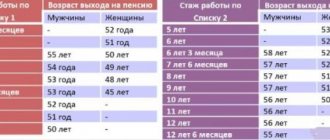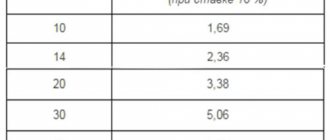The concept of northern pension
The “northern pension” should be understood as pension provision for a citizen who has worked for a certain period of his life in areas with complex and severe climatic conditions, geographically located in high latitudes.
The legislator allocates this period as a separate form of special length of service, which is calculated for preferential categories of citizens.
In general, the legislation distinguishes two types of localities, the implementation of labor activities in which automatically provides the right to preferential benefits. Let's look at this nuance in more detail.
- Far North. In the Russian Federation, such areas include those parts of the country that are located beyond the so-called Arctic Circle. All negative phenomena associated with working and living in northern conditions manifest themselves there. In our country, entire regions may fall into this category of localities; for example, the Chukotka Autonomous Okrug lies entirely beyond the Arctic Circle and a special procedure for providing benefits applies throughout the entire territory of the subject.
- Areas that, according to climatic conditions, are equated to the Far North . These areas are not located in high latitudes, but the climatic conditions in them are close in severity to those in the Far North due to their continental nature. In Russia, these include most of the Far East and Siberia. There is also a preferential treatment here, but the total amount of preferences provided is somewhat lower.
Reference! The “Northern Pension” is paid to all categories of workers, regardless of the field of activity in which they worked.
Previously, in accordance with the law, female workers, if they had a sufficient amount of work experience in unfavorable climatic conditions, had the right to count on financial pension coverage 5 years earlier. In other words, they retired at the age of 50.
The reforms being carried out in the country related to raising the age when citizens can apply for payments have also affected the “northerners”. It increases for them for 5 years. However, the increase is happening in stages. So, in 2021 you can go on vacation at 50.5 years old. At the end of the reform, women will be able to become pensioners at 55 years of age. It is scheduled for 2023.
What kind of northern experience is needed for women when applying for a pension?
Millions of citizens, including women, work in the unfavorable climatic conditions of the Russian north. The law provides that if they have enough time to work, they can retire 5 years earlier. To do this, you need to work in northern conditions for at least 15 years.
This requirement applies to both men and women.
How much work needs to be done - calculation nuances
Calculating the special period for receiving a pension on a preferential basis has a number of specific features. Thus, the ratio of special experience to actually worked periods is very important. It depends on the type of climatic conditions.
- Far North . When working in these areas, the ratio in question is 1:1. That is, the periods actually worked coincide with the calculation of the northern length of service. Accordingly, after actually working for 15 years in the Far North, a person is entitled to benefits.
- Areas equated to the Far North. When working in these territories, 1 year of actual work is counted as 9 months of experience. Thus, to receive the benefit, the production must be at least 20 years.
In practice, there are frequent cases when some citizens worked alternately in these two preferential territories with a special status. In this case, the experience is mixed. Its calculation is made for each period of work separately, taking into account the ratio of special experience to actually worked time, after which the results obtained are added up.
Also common is the situation when a woman has quite an impressive amount of work experience in special climatic conditions, but it is not enough to receive benefits in full. In this case, the rule applies according to which each year of working activity reduces the age for assigning a pension by 4 months.
A fairly common question when calculating special work experience is determining the periods that can be counted.
So, first of all, the direct labor activity of female workers is taken into account. In addition, periods when the employee was not busy with work are taken into account.
Among them it should be noted:
- paid annual leave;
- time spent on sick leave.
Under no circumstances does the northern special experience include studying in vocational education institutions, being registered with the employment service, or serving in the armed forces.
Important! Part-time work can be counted, however, if the citizen, in general, worked full-time.
Is maternity leave and parental leave included in northern seniority?
Many women who have worked and lived in areas with a harsh northern climate for a long time are concerned about whether periods of maternity leave are included in special work experience.
In accordance with current legislation, periods of incapacity due to pregnancy and childbirth may be taken into account when calculating length of service . The time spent on maternity leave is not currently included in the special northern work experience.
Parental leave was counted only if it was granted before October 6, 1992.
How is it calculated if a woman has two children and less than 15 years of experience?
Considering the provision that periods when women care for their young children are not included in special service, the legislator has provided for a certain relaxation for them. Thus, if an employee has at least two children born while in the northern regions, then the length of service requirements for her are automatically reduced to 12 years.
Accordingly, they can claim full benefits after 12 years of direct activity in the Far North.
Pension for men and women
Northern pension for men
Conditions:
- experience in the North - from 15 years (20 years in a similar area);
- age 55 years;
- period of total experience - 25 years.
Exception! Reindeer herders, hunters, fishermen with a total experience of 25 years can apply for a pension 10 years earlier!
As for length of service, 9 months of work in a cold locality is equal to one year of ordinary work. Consequently, when men work in the Far North for 8 years, each subsequent year brings the worker 4 months closer to retirement.
The amount of pension contributions is also influenced by the coefficient, which differs between different regions of the country.
In accordance with Federal Law-400, men who:
- scored more than 30 points;
- have reached retirement age;
- have experience according to “northern” indicators;
Northern pension for women
Conditions:
- work in the north - 15 years (or 20 years in nearby areas from the north);
- experience - 20 years;
- age - 50 years.
An exception is 45 years of actual residence in the northern cities of the country, as well as work in reindeer herding, fishing, and hunting.
Important differences between males:
If more than two children are born, a woman can apply for an early pension if she has at least 12 years of experience in the Far North (corresponding to 17 years in areas located near the North). This condition is enshrined in Article 32 of Federal Law-400.
The period of maternity leave is not counted towards the length of service. The same applies to the period when a woman is caring for a disabled child.
For all other indicators, the pension between the sexes is formed equally, while the Pension Fund takes into account the following criteria:
- general experience;
- northern experience;
- employer contributions to the Pension Fund;
- coefficient by region;
- accumulated points;
- age.
Law on the registration of northern pensions
This year, the issue of assigning northern pensions is being dealt with by the Pension Fund of the Russian Federation or the municipality, if there is no authorized institution in the region.
The right is granted by a multifunctional center (MFC) if the structures (MFC and government bodies) have concluded a number of agreements.
Registration process:
- checking conditions (experience and age) and collecting documentation;
- personal visit to the relevant structures to initiate and submit an application for pension payment. The necessary list of documentation is attached to it. The application can be sent by an interested person (pensioner), official representative or employer with the written consent of the employee. After reception, civil servants are issued a receipt confirming the acceptance of the documentation;
- The application is reviewed within 10 days. The applicant is then notified in writing of the decision. Within 5 days he will be informed of his acceptance (if there are any errors in the registration). After the deficiencies are eliminated, the review begins again.
Note:
accrual of payments begins on the first day of the month in which the documents were submitted, but earlier than 30 days before the appropriate age for payment of the pension.
List of documents for processing payments to citizens of the Far North
The northern pension also provides a fixed supplement to the basic part of the pension of northerners. The northern coefficient for calculating pensions will still depend on the area of residence.
Documents for registration:
- application form;
- work book and other evidence of accumulated experience;
- a certificate from the place of registration and location of the enterprise where the person worked (if required).
A number of additional papers may be required:
certificate of dependent and disabled wards, as well as documents if there has been a change of full name. or the registration of place of residence has changed.
Important!
All papers must be filled out correctly. If errors are detected, the case review process will be stopped.
Legal regulation of the calculation of the northern pension
The pension amount is determined to ensure that benefits are properly taken into account.
The payment consists of two components:
- fixed part;
- the amount calculated from regular contributions to the Pension Fund.
An increased pension for northern residents and workers is provided for in all respects (basic and insured amounts).
Fixed part of payments for citizens living and working in difficult climatic conditions:
Table parameters are taken as a basis. The pension is calculated according to the following algorithm:
- the fixed volume is multiplied by the regional coefficient;
- the amount received is added to the amount calculated from the amount of regular payments to the Pension Fund.
Each pensioner is able to independently recalculate the amount of payments in order to verify the data.
Thus, the northern pension is an increased benefit provided for citizens who have worked for many years in difficult, cold conditions. To receive it, citizens must reach a certain age, have accumulated experience and live and work in the northern region. At the same time, the law on the northern pension when moving provides for the preservation of a fixed payment, but the regional increasing coefficient will no longer be taken into account.
Accrual procedure
The process of calculating pension payments consists of two components:
- Fixed (basic) amount - determined by the state.
- The insured amount is determined from the total amount of pension contributions of the employer.
To determine the size of the pension, it is necessary to multiply the fixed indicator by the coefficient established for the region. And then we sum up the result obtained with the insured amount. Indicators of the basic part of the pension can be found in Federal Law-400. When calculating, you should pay attention to the following factors:
- They do not take into account the period when the employee was on the labor exchange and received the appropriate benefits.
- The period before and after childbirth is not included in the experience.
- Part-time work in two or more companies is not taken into account.
It is important to know! Pension increase in 2021
As a result, when calculating a pension, periods of military service, educational activities and the actual period of work are also taken into account.
The pension is calculated on the basis of instructions approved by the Ministry of Labor No. 2 of November 22, 1990!
The minimum level of insurance in 2021 is 8,000 rubles . The total amount of the northern pension is 30-50% higher than normal pension contributions.
Example of pension calculation: Basic data: Ivanov A.P. worked in the Republic of Karelia for 25 years. The basic pension is 5,865.53 rubles. The regional coefficient is 1.15. Calculations are made as follows: Fixed level * coefficient for continued work + individual regional coefficient * 74.27 (cost of one pension point) = pension amount. Well, now let's move on to the numbers: 5,865.53 * 1.15 + 54.4 * 74.27 = 10,785.4 rubles
For a simpler calculation, you can use a pension calculator, which will show the approximate size of your future pension in a few seconds. You can find it on the website www.pfrf.ru/eservices/calc. The received pension amount is conditional.
Registration of pension
Upon reaching the appropriate age, a woman who wishes to retire must take the following actions:
- calculate the length of service, check the availability of the necessary documents;
- collect missing papers;
- apply for a pension.
How to confirm northern experience
Among the documents that are submitted to assign payments, the following should be highlighted:
- passport;
- SNILS (if available);
- marriage certificates (if changing surname), birth of children;
- work book.
The main document that confirms the right to benefits is the work book. If it contains inaccuracies, then the citizen must provide documents confirming the relevant periods of work. They can be certificates, extracts from orders, payment slips, and so on.
Where to contact
To apply for preferential security, you should contact the Pension Fund at your place of residence. In addition, it is possible to submit a pension application through the State Services portal.
In a number of regions, citizens can submit the appropriate package of documents through the MFC.
Women who have worked for a long time in northern conditions have the right to count on early retirement. Depending on the type of terrain, this requires 15 or 20 years of experience. If it is available, in 2021 women will begin to receive pension benefits at age 50.5. However, this age will increase to 55 years by 2023.
Conditions for receiving in 2021
In order to qualify for the benefit, a number of conditions must be met:
- reaching a certain age limit – 55 years;
- northern experience 15 or 20 years depending on the region of residence;
- insurance experience of at least 20 years.
The above indicators are typical for women with one child. Conditions change for those citizens who have two or more children. They can retire 10 years earlier than the general rule. This provision is regulated by Federal Law No. 400 of December 28, 2013:
- you must have two or more children, whose age does not affect the registration of the northern pension;
- reaching 50 years of age;
- northern experience 17 or 20 years depending on the region of residence;
- total experience 20 years;
- The pension coefficient must be at least 30 points.
Attention! You can apply for a preferential pension without actually living in the regions of the Constitutional Court.
To do this, it is necessary to have northern experience, after achieving which the citizen has the right to move to another region. The table shows the age and year of retirement for a preferential pension for women according to the general rule (childless or having 1 child).
| Was | Age | It became |
| 2021 | 53 | 2024 |
| 2022 | 54 | 2026 |
| 2023 | 55 | 2028 |
Benefits for northerners upon retirement
Pension legislation provides for workers and residents of the North certain benefits related to pension provision:
- Reducing the retirement age . The retirement period for them is reduced depending on the accumulated northern experience. People who have worked for a specified number of years in the KS or ISS areas, regardless of their current place of residence, can count on early retirement.
- Social benefits (various types of compensation).
- Increased fixed payment (FV) towards retirement:
- If there is the required work experience in the KS or ISS areas, then the fixed payment increases by a certain percentage established by law: by 50% - for those who have worked 15 or more years in the KS areas and have an insurance experience of at least 25/20 years, respectively, men/women (h 4 Article 17 of Law No. 400-FZ);
- by 30% - those who have worked for 20 or more years in the ISS and have an insurance record of at least 25/20 years, respectively, men/women (Part 5, Article 17 of Law No. 400-FZ).
- If a person is registered or lives in a northern area, then the pension fund is increased by the corresponding amount of the regional coefficient (Part 9, Article 17 of Law No. 400-FZ of December 28, 2013).
Pensioners who receive an increased northern pension through the bank at the expense of the regional coefficient must annually confirm the fact of their residence in the KS or ISS areas by submitting an application to the Pension Fund or MFC. A personal application is required to confirm this fact, therefore it is impossible to submit such an application through your Personal Account on the Pension Fund website.
The size of the northern pension (namely, a fixed payment to it) is recalculated when moving to another Russian region, and depending on the value of the regional coefficient at the new place of residence, the pension can be either increased or decreased. We also note that when moving, the increase is adjusted only due to the regional coefficient, and the additional payment for northern experience is accrued even if you change place of residence.
The amounts of insurance pensions for northerners are indexed annually, just like for residents of all other regions of the Russian Federation. In connection with the ongoing reform in the period 2019-2024. The insurance pension will be indexed annually from January 1. For example, northern pensions in 2020 were indexed by 6.6% from January 1, 2021.
Features of pension formation
Working in the northern parts of the country's hemisphere is especially harmful for all citizens, so the state has established basic benefits that workers in the North can count on when applying for pension payments.
Peculiarities of calculating the Northern pension
Each district has its own coefficient, which depends on the climate, distance from a specific territory, as well as the level of negative impact on the citizen’s health. The coefficient significantly increases the total amount of pension payments for all types of contributions, such as: old age; disability; upon loss of a breadwinner.
When calculating a pension, not only the total length of service is taken into account, but also the following criteria:
- Military service;
- educational process;
- decree;
- part-time;
- advanced training courses;
- vacation;
- period of dismissal due to reduction.
Exceptions are: the period of leave during pregnancy (before and after childbirth); applying for a part-time position for two or more vacancies.
Design rules
To apply for a Northern pension, you must prepare the following documents:
- passport details;
- document confirming work experience;
- paper confirming the presence of northern experience;
- paper confirming the presence of dependents;
- certificate of registration at the place of residence;
- document on change of name;
- certificate of registration with the tax structure (if there is an individual entrepreneurship);
- military ID;
- paper confirming the fact of residence outside the country;
- document establishing a disability group.
In order to increase the amount of pension payments, you must additionally provide the following documents:
- official confirmation of work experience in the northern part of the country;
- reaching retirement age.
In addition to the basic documents, the future pensioner is required to fill out an application in accordance with the established rules of the Pension Fund. The future pensioner, his authorized representative, or the employer have the right to submit an application on the basis of written consent from the employee.
You may be interested in how to properly apply for a pension: step-by-step instructions.
Pension Fund employees review the papers within 10 days. The PFR specialist notifies the applicant in writing about the results of the inspection. If incomplete information is detected, the future pensioner receives a letter from the Pension Fund 5 days after submitting the documentation to correct errors.
It is important to know! Pension for children of war
What should be the length of service?
Conditions:
- a period of work of at least 15 years for women and men;
- at least 20 years of experience in any northern point of the country;
Men : age - from 55 years; northern—15 years (20 years of experience in an area equated to the North); the total period of work activity is 25 years. Women : Age - 50 years; northern experience - 15 years (or 20 years); the total service life is 20 years.
Features of calculating length of service in the Far North:
- until 2002, one and a half years of total experience were accrued per 1 northern year of work;
- after 2002 - one year is equivalent to 9 months of work for northerners.
The location of the northern city also influences the accrual of seniority! Information about the base areas of the North is in Resolution of the USSR Council of Ministers No. 12 of 01/03/1983!
Interesting Facts:
- When moving to a more favorable climate, pensions are calculated according to the scheme of the new location. That is, the amount of pension contributions directly depends on the actual place of residence of the future pensioner. At the same time, the indicators of northern experience remain unchanged anywhere in the country.
- The pension of the Far North is increasing both in the insurance part and in the basic part. The base part is calculated taking into account the coefficient. When moving, the coefficient is not applied. And the size of the insurance pension does not change when you change your place of residence.
- The amount of northern pension payments is 30-50% higher than the usual pension figures in the country.
- Since 2008, a bill has come into force, thanks to which pensioners from the Far North will be able to receive additional bonuses, regardless of their place of residence. The data is enshrined in Federal Law No. 312 of 01/01/2008. The main condition is having a fully worked experience of 15 years (or 20 years for areas close to the Far North).
- The northern pension is formed for all citizens who have worked in the Far North for the required period of time, and citizenship does not matter.
Normative base
Let us define the entire list of regulatory documentation that governs all issues regarding the pensions of northerners:
- Federal Law No. 166 of December 15, 2001;
- Federal Bill No. 400 of December 28, 2013 (hereinafter referred to as FZ-400);
- Federal Law No. 173 of December 17, 2001;
- Government Decree No. 651 of July 14, 2014, No. 367 of April 28, 2016
Main advantages:
- retirement age comes 5 years earlier;
- reduction of length of service;
- increase in the basic amount of pension payments;
- adding a regional coefficient;
- military personnel have the right to both labor and military pensions.
It is important to know! Indexation of pensions for non-working pensioners
Early retirement in the Far North
Conditions for early retirement for northerners are enshrined in Art. 32 of Law No. 400-FZ of December 28, 2013 “On insurance pensions”. The old-age insurance pension for them is assigned ahead of schedule - 5 years earlier than the generally established deadlines (according to clause 6, part 1, article 32 of Law No. 400-FZ), i.e. at 55 and 60 years old for women and men. To become an early retiree, the following conditions must be met:
| Retirement age (years) | Required experience in years | ||
| northern | general insurance | ||
| women | 55 | 15 years in KS areas or 20 years in ISS | 20 |
| men | 60 | 25 | |
Note: In addition to the length of service requirements, the minimum required number of IPC (pension points) must be met. If the northern work experience has not been fully developed, then the retirement age will be reduced in proportion to the period of work in the KS or ISS areas.
For northerners, it is also possible to have a so-called double reduction in the retirement age, for example, by an additional 5 years if the person worked in a hazardous industry during the established period. In this case, the requirements for length of service must be met for three indicators at once: insurance, northern and by type of work.
In addition to the above:
- For mothers of two or more , who have at least 20 years of insurance experience, as well as work experience in the CS areas of at least 12 years (or in the ISS 17 years), an insurance pension is assigned at 50 years of age (Clause 2, Part 1, Article 32 of Law No. 400-FZ).
- Hunters, reindeer herders, fishermen who have worked in their profession for at least 20 and 25 years (women and men), who live permanently in the areas of the KS or ISS, can become a pensioner upon reaching 50 and 45 years of age (clause 7, part 1 Article 32 of Law No. 400-FZ).
Retirement for northerners in a new way
It will soon become easier for residents of the Far North and similar areas to retire. The Ministry of Labor proposed to take part-time work into account in the total length of service of northerners. The department has developed a corresponding draft government resolution.
Residents of the Far North and equivalent areas can retire five years earlier than the generally established retirement age. The minimum length of service for early retirement is 15 calendar years in the Far North and 20 calendar years in equivalent areas.
Today, if an employee works part-time, he does not have the right to early retirement. They decided to change this norm. Periods of part-time work in the Far North and equivalent areas will be taken into account in the length of service giving the right to early assignment of an old-age insurance pension. The only condition is that insurance premiums must be paid for these periods.
Retirement in areas equated to the Far North in 2021
If they have sufficient northern experience, citizens who have worked in areas equated to the Far North (FN) also have the legal opportunity to retire 5 years earlier. Until the end of 2018, the retirement age standards for citizens working in the ISS areas were set at 50 and 55 years, but due to the reform, starting in 2021, these values for them are also increasing to 55 and 60 years.
- In addition to reaching the established age, you must have work experience in the northern regions in the prescribed amount. The legislation establishes that in order to retire early, northerners must have 20 years of work experience in the ISS.
- When developing incomplete work experience for a northerner, the retirement age will be reduced, and the calculation is made by equating the length of service in the ISS to the time of work in the CS areas in the following proportion: one full year of work in the ISS areas is counted as 9 months of work in the CS. The counting order can be summarized in a table:
| Period of work in the ISS, in years | The corresponding period of work in the Far North | |
| years | months | |
| 1 | 0 | 9 |
| 2 | 1 | 6 |
| 3 | 2 | 3 |
| 4 | 3 | 0 |
| 5 | 3 | 9 |
| 6 | 4 | 6 |
| 7 | 5 | 3 |
| 8 | 6 | 0 |
| 9 | 9 | |
| 10 | 7 | 6 |
| 11 | 8 | 3 |
| 12 | 9 | 0 |
| 13 | 9 | |
| 14 | 10 | 6 |
| 15 | 11 | 3 |
| 16 | 12 | 0 |
| 17 | 9 | |
| 18 | 13 | 6 |
| 19 | 14 | 3 |
| 20 | 15 | 0 |
Retirement age for residents of the Far North and equivalent areas
07.08.2019 19:: 41532
Residents of the Far North and equivalent areas have the right to early retirement 5 years earlier than the generally established retirement age. Northerners retain this right in the future. At the same time, the age of early retirement for residents of the North is gradually increasing by 5 years: from 50 to 55 years for women and from 55 to 60 years for men. The minimum required northern length of service for early assignment of a pension does not change and remains 15 calendar years in the Far North and 20 calendar years in equivalent areas. The requirements for insurance experience similarly do not change and are 20 years for women and 25 years for men. The transition period to raise the retirement age of northerners will last, like everyone else, for 10 years – from 2021 to 2028. At the first stage, the age increase will affect women born in 1969 and men born in 1964. At the same time, northerners, who, according to the old legislation, should have been assigned a pension in 2019–2020, also have the right to a benefit for retirement six months earlier than the new retirement age. For example, a man born in 1965 (July), with 30 years of work experience in the north and 35 years of insurance experience, will retire in January 2022 at the age of 56.5 years. Following the transition period, northern women born in 1973 will retire in 2028 at the age of 55. and at the age of 60 years, northern men born in 1968. Retirement age for women: Year of birth Conditions of retirement Age year of retirement 1969, I half of the year 50.5 2021 II half of 1969, II half of the year 50.5 2020 I half of 1970, I half of the year 51.5 2021 II half of 1970, II half of the year 51 .5 2022 I half of the year 1971 53 2024 1972 54 2026 1973 55 2028 Retirement age for men: Year of birth Conditions of retirement Age year of retirement 1964, I half of the year 55.5 2021 II half of 1964, II half of the year 55.5 2021 I half of the year 1965 , I half of the year 56.5 2021 II half of 1965, II half of the year 56.5 2022 I half of the year 1966 58 2024 1967 59 2026 1968 60 2028 At the same time, the transition period for raising the retirement age also applies in cases where the northern length of service has not been fully developed, and There is a decrease in the age for granting a pension for each year worked in the northern region. Example: A woman born in 1970 (March), who has 15 years of work experience in an area equated to the regions of the Far North and 21 years of insurance experience, according to the old legislation, was supposed to retire in July 2021 at the age of 51 years and 4 months. Considering that in 2021 the retirement age will be raised by three years, a woman will be able to retire in July 2024 upon reaching 54 years and 4 months. Some northerners, however, will not have to adapt to the new retirement age, since it will not be increased for them. The changes will not affect women who have raised two or more children - if they have the necessary northern and insurance experience, they will be entitled to a pension starting from the age of 50.
According to what schedule will people who have the right to receive it early retire?
Starting from 2021, the old-age retirement schedule, in accordance with Law No. 400-FZ, has changed for the following citizens:
1. Northerners (clause 6, part 1, article 32). This category includes people who simultaneously:
- have worked for at least 15 years in the Far North or worked for 20 years in equivalent areas;
- have received the necessary insurance experience (men - from 25 years, women - from 20).
- Their retirement age was raised from 55 to 60 years and from 50 to 55 years (for men and women, respectively). At the same time, they can still become pensioners 5 years earlier than citizens who fall under the general conditions.
2. Teachers and doctors (paragraphs 19–20, part 1, article 30). The period during which they will be able to exercise their right to pension provision will be gradually increased from a year from the moment it arose to 5 years, in accordance with Appendix 7 to Law No. 400-FZ.
3. Creative workers (clause 21, part 1, article 30). For some of them, the age at which they have the right to retire early will increase in accordance with the List of professions and positions approved by Resolution of the Council of Ministers of the RSFSR dated August 28, 1991 No. 447:
- for wrestlers involved in circuses and concert organizations (clause 2) - from 50 to 55 years old;
- for actors of drama theaters (clause 3 and clause 4) - from 50 to 55 years and from 55 to 60 years, respectively.
Citizens of other creative professions will become pensioners at the same time as specialists from item 2 of our list. The duration of the required length of service, the procedure for determining and calculating it, as well as the amount of the IPC remained the same.
Now only by application. The scheme for increasing pensions for northerners has been changed
From June 1, 2021, the procedure for assigning increased pensions to residents of the Far North has changed. Before this, there was a simplified procedure introduced due to the pandemic, according to which there was no need to submit an application: the actual place of residence was clarified by the fund’s specialists as part of interdepartmental interaction with the Ministry of Internal Affairs, according to employers, or by telephone in direct communication with the pensioner.
What will happen now ? Russians living in the Far North are entitled to a fixed payment towards their pension. Its size will vary depending on the subject of the Russian Federation - for each of them the government sets its own increasing coefficient.
In this case, northern pensioners will have to re-apply for their actual place of residence in person. Such documents are accepted at the territorial office of the Pension Fund or MFC at the place of residence.
The application is submitted once a year. It must be submitted before the expiration of 12 months from the date of filing the application for a pension or submitting a previous application.
Which territories of the Russian Federation are classified as the Far North and allow them to receive benefits and compensation? The regions of the Far North and equivalent areas include the islands of the Arctic Ocean and its seas, the Republic of Sakha, the Sakhalin region, the territories of the Kamchatka and Krasnoyarsk territories, Chukotka, the Magadan and Murmansk regions, the Republics of Komi, Tyva, Karelia, Altai, Buryatia, the territories of the Primorsky and Khabarovsk Territory, Khanty-Mansi Autonomous District, Yamalo-Nenets Autonomous District, Perm Territory, Arkhangelsk Region, areas of the Amur and Irkutsk Regions.
What's in your plans? The Ministry of Labor proposed to take part-time work into account in the total length of service of northerners. The department has developed a corresponding draft government resolution. Residents of the Far North and equivalent areas can retire five years earlier than the generally established retirement age. The minimum length of service for early retirement is 15 calendar years in the Far North and 20 calendar years in equivalent areas.
Today, if an employee works part-time, he does not have the right to early retirement. They decided to change this norm. Periods of part-time work in the Far North and equivalent areas will be taken into account in the length of service giving the right to early assignment of an old-age insurance pension. The only condition is that insurance premiums must be paid for these periods.
Pension reform for northerners (latest news)
On October 3, 2021, the President signed a law amending pension legislation, including raising the retirement age in Russia, which will apply in particular to northerners. If by the end of 2021 they could become pensioners upon reaching 50 and 55 years of age (if they have the necessary northern experience), then after the reform these standards will be increased by 5 years - to 55 and 60 years.
Changes will occur gradually, with a gradual increase in standards during the established period - from 2021 to 2023. Therefore, citizens of different years of birth will retire at different ages according to the schedule provided by law.
It is worth noting that the pension reform will not affect mothers with two children who have the required northern experience; reindeer herders, fishermen, commercial hunters living in the areas of the KS or ISS; northerners who work in hazardous or heavy production. For them, all stipulated standards and conditions remain the same.
Raising the retirement age for residents of the Far North
The main change in the pension reform from 2021 is the gradual increase in the retirement age, including for northerners. The retirement age for northerners who have accumulated the required amount of northern experience will be increased according to the following principle:
- From 2021 to 2023, the standard will be increased annually by 1 year until the final values of 55/60 years are established for women and men.
- In the first two years (2019-2020), an additional benefit is provided - payments can be issued six months earlier than the deadlines established by the new law: in 2021, women aged 50.5 years and men aged 55.5 years will be able to become pensioners;
- in 2021 - at 51.5 and 56.5 years, respectively.
If you have incomplete northern work experience, a proportional reduction in the retirement age from 2021 will be carried out relative to the new standards, taking into account the envisaged schedule for increasing the age. From 2023, the reduction will be carried out relative to the final standards - 60 years for women and 65 years for men.
Retirement schedule by year for northerners
During the transitional provisions of the new law on retirement age, the year of registration of the northern pension will depend on the year of birth of the future pensioner, since the values of the standards will be adjusted annually. The planned reform will affect only those citizens who must become pensioners from 01/01/2019 - these are women born in 1969 and men born in 1964.
The retirement schedule by year for northerners is presented below in table form:
| Women | Men | When will they be able to apply for a northern pension? | ||
| DR | PV | DR | PV | |
| 1st half of 1969 | 50,5 | 1st half of 1964 | 55,5 | 2nd half of 2019 |
| 2nd half of 1969 | 2nd half of 1964 | 1st half of 2020 | ||
| 1st half of 1970 | 51,5 | 1st half of 1965 | 56,5 | 2nd half of 2021 |
| 2nd half of 1970 | 2nd half 1965 | 1st half of 2022 | ||
| 1971 | 53 | 1966 | 58 | 2024 |
| 1972 | 54 | 1967 | 59 | 2026 |
| 1973 | 55 | 1968 | 60 | 2028 |
Note: DO - date of birth; PV is the value of retirement age.
Thus, women born 1969-1972 and men born in 1964-1967 who have the required amount of northern experience will be subject to the transitional provisions of the new law. This means that not final age standards will be established for them, but gradually increasing from 0.5 to 4 years.
For the female population born in 1973 and male since 1968 The final provisions of the law will apply - they will be able to become pensioners upon reaching 55 and 60 years of age (if they have the required work experience in the KS and ISS areas).
Retirement table for northerners in 2021
In 2021, in accordance with the schedule for increasing the retirement age, women at 51.5 years old, as well as men at 56.5 years old, can go on a well-deserved legal rest.
The age correspondence of northerners who stop working during the system reform process is shown in the table:
| Female population | Male population | Retirement under the new reform | ||
| Date of Birth | Age | Date of Birth | Age | |
| 1 p. 1969 | 50,5 | 1 p. 1964 | 55,5 | 2 p. 2019 |
| 2 p. 1969 | 2 p. 1964 | 1 p. 2020 | ||
| 1 p. 1970 | 51,5 | 1 p. 1965 | 56,5 | 2 p. 2021 |
| 2 p. 1970 | 2 p. 1965 | 1 p. 2022 | ||
| 1971 | 53 | 1966 | 58 | 2024 |
| 1972 | 54 | 1967 | 59 | 2026 |
| 1973 | 55 | 1968 | 60 | 2028 |
Note: p. - half a year.
The principle of calculating the northern experience
The insurance benefit for Russian citizens of retirement age has two main components: fixed and insurance.
Northern seniority provides a guarantee of an increased fixed share:
- 7,473.35 rubles – a fixed payment for persons who have worked in the Far North for more than 15 years, taking into account 20 and 25 years of total experience for women and men, respectively;
- 6,477.77 – the established portion for those who have been officially employed for at least 20 years in regions that are considered equal to the Far North in terms of conditions;
- the insurance pension increases taking into account the regional coefficient for persons who live in the corresponding region.
The fixed part of insurance payments increases taking into account regional coefficients for the following groups of persons:
- retired due to age;
- received disability>;
- families who have lost their breadwinner.
The value of the coefficient is set depending on weather, climatic and other conditions characteristic of the area under consideration. This parameter is taken into account as long as the persons receiving the benefit live in the area.
If a pensioner from another region of Russia with normal climatic conditions moves to any of the regions of the Far North and equivalent regions, then his pension can be recalculated taking into account the regional coefficient.
If you worked on a rotational basis
The Labor Code of the Russian Federation contains norms that guarantee compliance with preferential conditions for those Russian citizens who worked on a rotational basis in the Far North and equivalent places. The northern length of service for this group of persons includes calendar days of shift.
Important! Employees' travel to their place of work is also counted during the working period. According to the legislation of the Russian Federation, the “northern” bonus is also calculated taking into account the days of rest between shifts.
Is it possible to make a calculation based on labor
When calculating insurance payments for persons with length of service in the Northern region, not only the period of work, but also other entries in the work book are taken into account. In some cases, northern experience may include military service, study and recreation time.
For male conscripts who served in the Northern regions until the end of 1991, and then remained there and were officially employed, the army will be taken into account in the Northern length of service.
For military personnel who were on duty in the regions in question before 2002, special benefits are also provided upon retirement . Moreover, each year of service is equivalent to 18 months of service. When applying for a pension, you must include a military ID with the relevant records in your list of documents.
During the period of official work for workers on a rotational basis, in addition to working days, travel and rest time between shifts is also counted.
Northern experience for retirement
Northern experience is the total time that a person worked in the Far North and the territories that were equated to it. It is considered a special type of length of service and is taken into account when assigning a pension.
Reference! Whether a particular region or even a settlement is a territory of the Far North or equivalent to them or not is determined not only by geographical characteristics. To simplify and unambiguously answer questions, the Government of the Russian Federation issues Resolutions that list specific regions in which work makes it possible to “earn” a preferential pension.
Having northern experience is the basis for receiving the following preferences:
- the opportunity to retire earlier;
- increased amount of payments determined individually for each person;
- various benefits (for example, for the provision of housing).
Important! Only official work time is taken into account. A person must ensure that all relations with the employer are documented. Otherwise, after working for many years in difficult climatic conditions, a person may not receive the right to the required benefits. If an employer avoids drawing up an employment contract, you can contact the labor inspectorate for help.
What is included in the northern experience
Northern experience includes the time that a person officially worked at various enterprises in the Far North (and in equivalent areas). Some categories of citizens have the right to expect that periods of military service, study, as well as rest, travel, etc. will also be included in the northern period of service.
Reference! In the past, there was a different procedure for accounting for northern experience, but at present it is not applied and is not relevant.
Northern retirement experience for men and women
Millions of men and women work in the northern regions of the country. To obtain the right to retire early, citizens must simultaneously fulfill several conditions:
- score the required number of points – 30;
- obtain the necessary experience, including work in the north and any other areas;
- have northern experience - 15 years;
- reach the age established for early retirement.
To fully use the benefits for their intended purpose, men and women must have 15 years of northern experience. This norm is the same for both sexes. But if a woman has given birth to 2 or more children, then the requirements for northern experience will be reduced to 12 years.
For a long time, early retirement was set at 50 for women and 55 for men. But raising the retirement age also affects all those who work in the Far North. By 2023, it will be 55 years for women and 60 years for men.
The retirement age for “northerners” is being raised gradually – by 1 year each year. Moreover, in 2021 and 2021, they, like everyone else, have the right to receive a pension six months earlier than the deadline established by the new legislation. In 2021, women with full northern experience can count on receiving payments from the Pension Fund at 50.5 years, and men at 55.5 years. In 2021, for northern men, the retirement age will be 56.5 years, and for women – 51.5.
Retirement table by northern length of service
What will not be included in the northern retirement experience for men and women
The northern length of service does not include all periods of time that are counted in the normal period of employment. In particular, the following periods are not added to the period of work in the Far North:
- the time when the citizen did not officially work, even if he was registered with the employment service;
- period of training in various educational organizations (from vocational schools to universities);
- service in the ranks of the Armed Forces (with the exception of certain cases, for example, for career military personnel);
- leave to care for children up to 1.5-3 years old.
When working part-time, this period will be counted toward the length of service only if the person ended up working full-time. Although care leave is not included in the calculation, women have the right to include pre- and post-natal leave, paid on the basis of certificates of incapacity.
The procedure for confirming northern experience
Registration of pension payments for such persons occurs according to general rules. The Pension Fund of the Russian Federation sets the amount of insurance payments for citizens, which can be increased taking into account the regional coefficient. This benefit is valid as long as the pensioner lives in the area for which the coefficient applies.
Men and women with years of service in the North are entitled to retire earlier than other citizens: from 60 and 55 years, respectively. The package of certificates is submitted several months before retirement.
This time reserve makes it possible to collect the missing papers in case of submitting an incomplete package of documents for the first time. Typically, the application is processed within two weeks. If the application is submitted late, months without insurance payments will not be reimbursed.
The package of papers for the Pension Fund of the Russian Federation must contain:
- completed application form;
- photocopy of passport;
- employment history;
- employment contracts confirming employment;
- documents, certificates and acts that confirm employment and/or residence in the Far North or in areas with equal climatic conditions.
When moving to another region of the country with more favorable weather conditions, pensioners are denied a “northern” pension, since the regional coefficient ceases to apply to them.
Life in the Far North and nearby territories is characterized by difficult working conditions. Such citizens are under the social protection of the state, which guarantees benefits upon retirement subject to the established period of work experience. When calculating the pension supplement, which for Russian citizens ranges from 30 to 50%, regional coefficients are taken into account.
Reference! An increased fixed payment is provided for persons who have permanent and temporary registration in the Northern regions, as well as for citizens actually residing in this area at the time of receiving benefits.
Increase
The state restored justice to the northerners - people who spent most of their lives working in extremely difficult conditions. Starting next year, the basic part of their pensions will increase by at least 1.3-1.5 times.
On Tuesday, December 5, Rossiyskaya Gazeta published
a law amending pension legislation that affects more than 1 million people.
We are talking about northerners - those who worked for at least 15 years in the Far North or 20 years or more - in areas equal in natural and climatic conditions to the northern territories. The topic of infringement of the interests of northerners has been vigorously discussed at all levels over the past few years. The fact is that the current pension legislation does not allow northern pensioners to “export” the northern coefficient to the mainland. Simply put, having worked for the required period in the “northers” and, it would seem, having earned a decent pension there, after returning to the mainland, pensioners lost their northern bonus. In the previous amount, they were paid only the insurance part of the pension, which is calculated based on the amount of earnings and insurance contributions transferred to the Pension Fund. But the basic pension, which in the northern territories was paid taking into account an increasing coefficient, was immediately recalculated downwards when moving.
This rule of law has been mercilessly criticized. The main argument is that this situation hinders the return of people who have reached retirement age to more favorable natural and climatic conditions for life. However, the government objected: the regional coefficient to the basic pension is not the money that a person earned when he worked in more difficult conditions (that is, the insurance part of the pension), but only monetary compensation for increased expenses when living in areas with more expensive living costs . It is no coincidence that in the northern territories all payments are multiplied by an increasing factor - not only salaries, pensions and scholarships, but also children's and other social benefits.
“When a person of working age leaves the northern region, it never occurs to him to demand a northern salary coefficient in a new place,” Yuri Voronin, head of the department for the development of social insurance and state security of the Ministry of Health and Social Development, explained to RG. “However, with regard to pensions, this is exactly the approach that is practiced, although in both cases the purpose of calculating the northern coefficient is the same.
The President in his annual Address set the task of dealing with the problem of the northerners. As a result, legislators appear to have found the most optimal solution.
“The pension legislation provides for payment of the basic part of the pension in an increased amount to some categories of pensioners,” says Yuri Voronin. — For example, double the basic pension is paid to persons who have reached the age of 80 and disabled people of the 3rd degree of disability. The basic pension also increases if the pensioner has dependents in his care. That is, an increased basic part of the pension is due to those pensioners who have additional expenses in comparison with other pensioners who do not need constant outside care and do not have to support disabled family members.
In the case of the northerners, it was decided to follow the same path: to increase the size of the basic part for those who lived for a long time in extreme climatic conditions, which could not but affect their health. As a result, northern pensioners, as a rule, have a need for additional expenses, for example, for the purchase of medicines, which must be compensated by establishing an increased amount of the basic part of the pension. Moreover, in this case, a new, increased volume of the basic part will be installed and valid for everyone who has worked the required number of years in the conditions of the Far North or equivalent areas, regardless of where these people now live.
A very important point: the law fully preserves the rule that for all pensioners who continue to live in the northern territories, regardless of whether they have northern experience, in addition to the pension established for them, incl. and social, an increasing northern coefficient is calculated. However, in cases where a citizen has both the right to the regional coefficient (since he continues to live in the North) and to a new increased size of the basic part due to the length of work, these two factors do not “add together”. That is, a person gets the right to choose: will he receive the usual amount of the basic pension, multiplied by the corresponding regional coefficient, or will it be more profitable for him to receive a new increased amount of the basic pension.
Three simple questions
1 Why does the law offer pensioners the right to choose: to receive a “regular” basic pension, taking into account the regional coefficient, or a new “northern basic” pension?
Imagine this situation. The pensioner worked for 25 years in the Far North, and then moved to an area where the regional coefficient applies, but it is not the maximum - for example, 1.3. In this case, it is more profitable for a person to receive a new increased basic pension, since it is 1.5 times more than the usual basic pension. And, conversely, if a pensioner “earned” an increased basic pension by working in an area equated to the northern territories, and then went to the Far North, it is better for him to apply for a regular basic pension. multiplied by a higher northern coefficient.
In all cases, the relevant Pension Fund department will automatically determine for the pensioner the most beneficial option for his pension provision. The citizen himself does not need to submit any application or go to an appointment with the Pension Fund.
2 Does the new law apply to those pensioners who have already left the northern territories?
Yes. An increase in pensions will occur for all citizens who have the required calendar service (15 years in the Far North and 20 years in equivalent areas) and insurance coverage (25 years for men and 20 years for women), even if they have already lived outside the northern and equivalent territories.
3 How will “northern basic” pensions increase in the future?
They will be indexed in the same order and within the same terms as for all other pensioners. Thus, the next next indexation is scheduled for August 1, 2008. All basic pensions will increase by 15 percent.
Social payments to northern pensioners
For “northern” pensioners, there are a number of social payments that are provided only to non-working citizens, for example, compensation for expenses for moving from the Far North or ISS regions and compensation for travel expenses to a vacation spot and back.
Reimbursement for moving expenses is made in case of relocation to a new place of residence only within Russia. The procedure for compensation is regulated by Decree of the Government of the Russian Federation No. 1351 of December 11, 2014.
- This payment is provided only to those with registration in the North, and not just to those actually living in these areas.
- Compensation is paid to pensioners receiving insurance pensions or state support, as well as family members of pensioners who are dependent on them.
- The size of the payment is determined as the amount of actual expenses incurred to pay for the move of the pensioner and his family members to a new place of residence by rail, sea, air, road or inland waterway transport.
- You can receive such compensation at any time by submitting an application to the Pension Fund.
The procedure for compensation for travel to and from a vacation spot is regulated by Government Decree No. 176 of April 1, 2005.
- It is made to pensioners who receive old-age and disability insurance pensions and live in the KS and ISS areas.
- Compensation is provided no more than once every two years and only for trips within the territory of the Russian Federation.
- The amount of payment is determined as the cost of actual expenses incurred to pay for a citizen’s travel to the place of vacation and back by sea, rail, air, road or inland waterway transport.
Retirement table by year
The reform, which was launched in the coming year, is gradual. Accordingly, the time to reach retirement age will be different for women. Let's look at the main factors influencing this.
As can be seen from the table, the time to reach retirement age depends on the time of birth:
- Born in 1964 go on vacation with a delay of six months: not at 55, but at 55 and a half years.
- Women whose 55th birthday will be in 2021 will have to postpone their well-deserved rest for a year and a half. They will retire only in the second half of 2021.
- For persons born in 1966-67. birth, retirement will be delayed another year. They can retire at the ages of 58 and 59 years.
- Those born in 1968 and later retire in full accordance with Federal Law No. 350 - upon reaching their sixtieth birthday. They will complete the transitional process of increasing the retirement age.
Who is not affected by the changes?
The retirement schedule under the new law has not changed in any way for the following citizens:
- persons who have become disabled due to military trauma;
- mothers of many children with five or more children whom they raised until they were 8 years old;
- those who reached retirement age under the old legislation before 01/01/2019, including those who have not yet accumulated the required length of service and IPC;
- residents of the Far North and equivalent areas;
- parents or guardians who raised a disabled person from childhood to 8 years;
- midgets and disproportionate dwarfs;
- women working in the Far North and equivalent areas with two or more children;
- people with the first group of visual disabilities;
- victims of the accident at the Chernobyl nuclear power plant and other radiation or man-made disasters (with the exception of government employees);
- workers in coal mines, mining industry, ferrous and non-ferrous metallurgy, railway and other industries with harmful, dangerous and difficult working conditions.
In order to exercise their pension rights, these persons must accumulate the required length of service (insurance or in certain types of work) and IPC.
Which new categories of citizens will become pensioners early?
In addition to people whose pension conditions have not changed in any way, there are categories of citizens for whom the reform provided the opportunity to receive a pension earlier than the new period. In particular, the new version of Law No. 400-FZ made it possible to assign an old-age insurance pension to mothers with many children with insurance experience of 15 years, who gave birth and raised four children before the age of 8, from the age of 56 (clause 1.1, part 1, article 32 ), three children - from the age of 57 (clause 1.2, part 1, article 32).
At this time, they can become pensioners if they earn the required IPC amount. It should be noted that when determining the right to an old-age insurance pension, a woman’s children are included, in accordance with Part 3 of Art. 32 of Law 400-FZ, those in respect of whom the court has deprived her of parental rights or canceled the adoption will not be taken into account.
Guarantees for pre-retirees
Another innovation is the concept of “pre-retirement age”. It is achieved by citizens who have no more than 5 years left until their expected retirement, taking into account the transition period. This time period is relevant for those who expect to retire both on a general basis and ahead of schedule.
For pre-retirement people, the legislator provided:
- two paid working days annually in order to undergo medical examination, provided at the request of the employee after he agrees with the employer;
- the opportunity to receive unemployment benefits in an increased amount and for a longer period;
- job guarantee. On October 14, 2018, criminal liability was introduced for unjustified dismissal or refusal to hire a pre-retirement employee (Article 144.1 of the Criminal Code of the Russian Federation).
The specified five-year period will not be decisive only for tax benefits. Citizens who have reached the retirement age limits established before the reform have the right to use them.
So, the general level of increase in the retirement age was 5 years for all categories of the population, except beneficiaries. At the same time, Law No. 400-FZ provides for such innovations as:
- transition period;
- slight growth in the first few years;
- the opportunity to retire early for mothers with three or four children;
- the concept of “pre-retirement people” and additional guarantees for those who fall under this definition.
The requirements for insurance experience and IPC remained the same.











